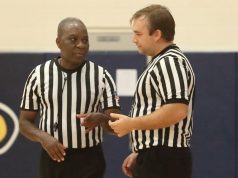During the COVID-19 pandemic, the officiating industry has taken a heavy blow. All officials in some shape or form were impacted and continue to face challenges going forward. Games across the globe have been postponed or canceled, in-person training camps have been dropped and the normal camaraderie associated with officiating has drastically changed. Many officials were forced to stay home, and everything thrown at them from the news, social media, television and radio was increasingly negative. All of that information makes it easy to get sucked into the wormhole of negativity.
There are ways, however, to stay above it and proper ways to deal with the emotions officials are feeling during this time. Dr. Megan Buning, PhD, teaching specialist in the Florida State University Coach Interdisciplinary Center for Athletic Coaching, has seen firsthand the impacts on officials as she was in the middle of mental-performance research on collegiate officials when the pandemic began. A former standout pitcher for the University of South Carolina softball team, Buning has found a niche working on improving the mental performance of game officials and was working with a group of collegiate softball umpires across all levels of play when games shut down. Below are some of the ways she encourages officials to understand how to handle the current climate.
Feel Your Emotions
During this time, it is important to understand there is no “normal.” This is an unprecedented time and not everyone is going to handle this situation the same way.
“I would encourage those, that whatever emotion you are having, let yourself feel it,” Buning said. “You need to allow yourself to feel whatever emotion it is and know that it is OK. These emotions you’re having are normal.”
Officials are often expected to be robots and show no emotion, which is why this time can be so difficult. Experiencing emotions and not being sure how to release them can create additional stress. Officials also get the wrong impression that showing emotion is a sign of weakness, when in reality it is a normal function that all humans experience.
“Particularly in the athletic field, we get pushed into, ‘Don’t show your emotions, suck it up, be tough.’ That isn’t a healthy way to approach emotions, especially something as big as this,” Buning said.
Disenfranchised Grief
A common feeling for officials during this time is the sense of loss. Many officials’ identity is tied to what they do. Having games taken away and lost income are a real sense of grief for them. This is referred to as disenfranchised grief as it isn’t socially accepted as grief. Most people associate grief with losing someone. However, if officiating is a huge part of who one is, losing that large sense of self can cause grief. The significant loss of income and the stress associated with that can also cause grief for officials.
“One umpire lost $10,000 just like that when they canceled athletics,” Buning said. “That is a big deal.”
And there were several more stories like that all over the country. Buning stated it is important for officials to acknowledge what they are feeling, give themselves permission to feel that and try to articulate what they are feeling. This is all part of emotional regulation and emotional intelligence.
“I’m feeling infuriated that I can’t make an income or I’m feeling at a loss because this is part of my identity,” she said. “You can feel it all at once. Mindfulness — that is powerful.”
She said officials should allow themselves time to just feel what they are feeling and to take a pause. It can be very overwhelming, and trying to deal with everything all at once and trying to solve all the problems at once is unhealthy.
Control The Controllable
In all aspects of life, there are things you can and can’t control. It is important to focus on the things you can control and try not to worry about the things you can’t. One technique is to fill out a Circle of Control. This allows officials the ability to write down the things they can control, the things they can’t control and the things they can influence. Buning said officials often think through these things, but it is important to write it down on a piece of paper as that gives it power.
“It gives a reminder that I can’t do anything about it,” she said. “Leave the uncontrollable alone. You have no control over those. Work on the controllable.”
Adapt Officiating Skills To Life
During these times, it is important for officials to rely on the things they know. There are a lot of things officials do in uniform that translate perfectly to everyday life and it is important to put those skills to use.
“I think something people overlook in the sports world is the fact they know how to adapt,” Buning said. “You know how to adapt, so instead of trying to do the same routines pre- COVID, look at how you can adapt your routines now. They are going to be more fluid and you have to be OK with being uncomfortable. How can you modify some of your routines to keep you more in a flow so you stay mentally more stable?”
Some of those adaptations include using social media in order to stay in touch with fellow crew members or watching webinars on specific topics related to the sport you officiate.
These social media tools can be new to many umpires and they may feel uncomfortable using them. Officials are often told to stay away from social media, but during these times it is important to stay social and not get isolated. It’s important to take precautions to avoid leaving a big social media footprint during this time, however.
Not everyone is ready to jump into studying rules and mechanics or view webinars immediately and may need more time to grieve. It is important to use the tools learned as an official to adapt to each new day. “Use what you use on the field — one pitch at a time, one play at a time, one inning at a time,” Buning said. “Today’s world may be one hour at a time, one task at a time, one day at a time. Stay in the moment and that will help.”
Brad Tittrington is an associate editor for Referee.
What's Your Call? Leave a Comment:
Note: This article is archival in nature. Rules, interpretations, mechanics, philosophies and other information may or may not be correct for the current year.
This article is the copyright of ©Referee Enterprises, Inc., and may not be republished in whole or in part online, in print or in any capacity without expressed written permission from Referee. The article is made available for educational use by individuals.

















